Dunore Point Energy Storage Project (2024)
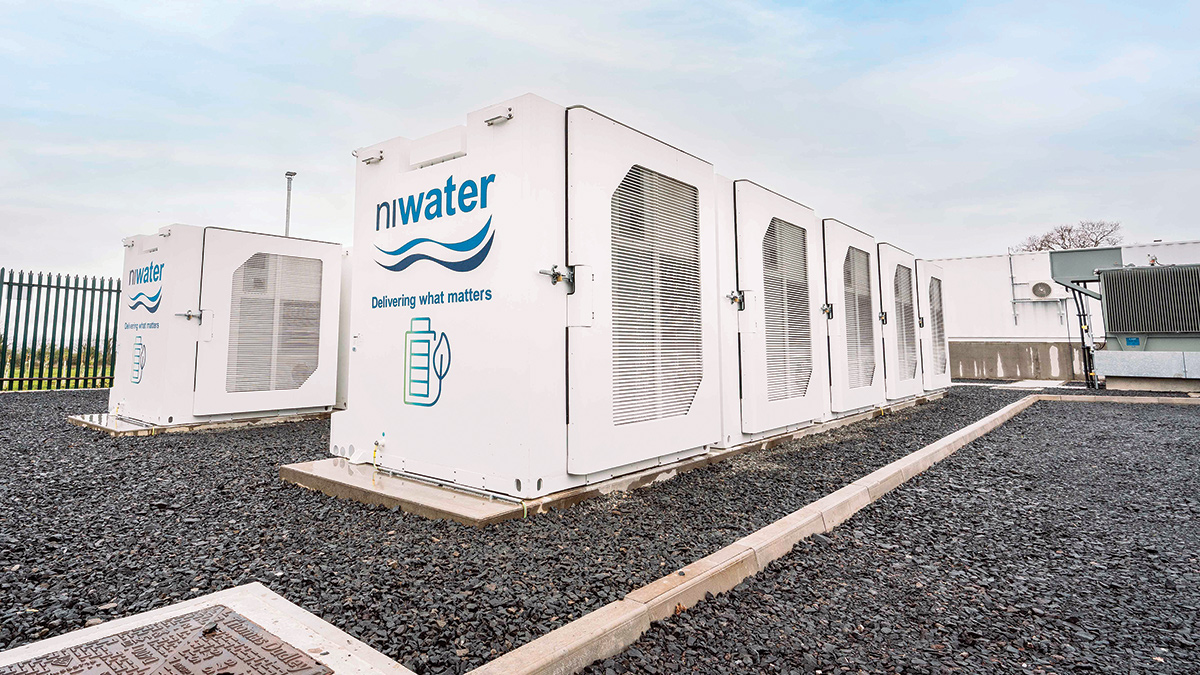
Battery Energy Storage System (BESS) Cubes – Courtesy of NI Water and GRAHAM Construction
Northern Ireland Water (NI Water) is one of the first public sector organisations to install a state-of-the-art battery energy storage system (BESS). The 4.1 MW battery helps store surplus energy from on-site solar panels at one of NI’s largest water treatment plants; Dunore Point, Antrim. The battery has a 5.6 MWh (megawatt hour) total capacity which helps to store surplus energy generated from approximately 24,000 solar panels. The battery means that during periods of low customer demand, NI Water can store this surplus renewable energy to use later during peak times. The company can therefore power its operations at a lower cost and keep water flowing. This is a vital step in NI Water’s journey to net zero, balancing supply and demand on the local grid, providing improved site resilience and security of water supply.
Primary drivers
The purpose and drivers for this project were as follows:
- Contribute to NI Water’s 2050 energy strategy and strategic objectives/priorities.
- Generating additional revenue.
- Reducing impact of price volatility.
- Increasing the use of renewable energy to mitigate the effects of climate change.
- Reducing emissions related to the use of fossil fuels/toward zero carbon.
- Facilitating opportunities to harness further renewable technology and market participation which NIW may take advantage of in the future.
- Improve resilience of NI Water’s energy supply to protect and serve our customers.
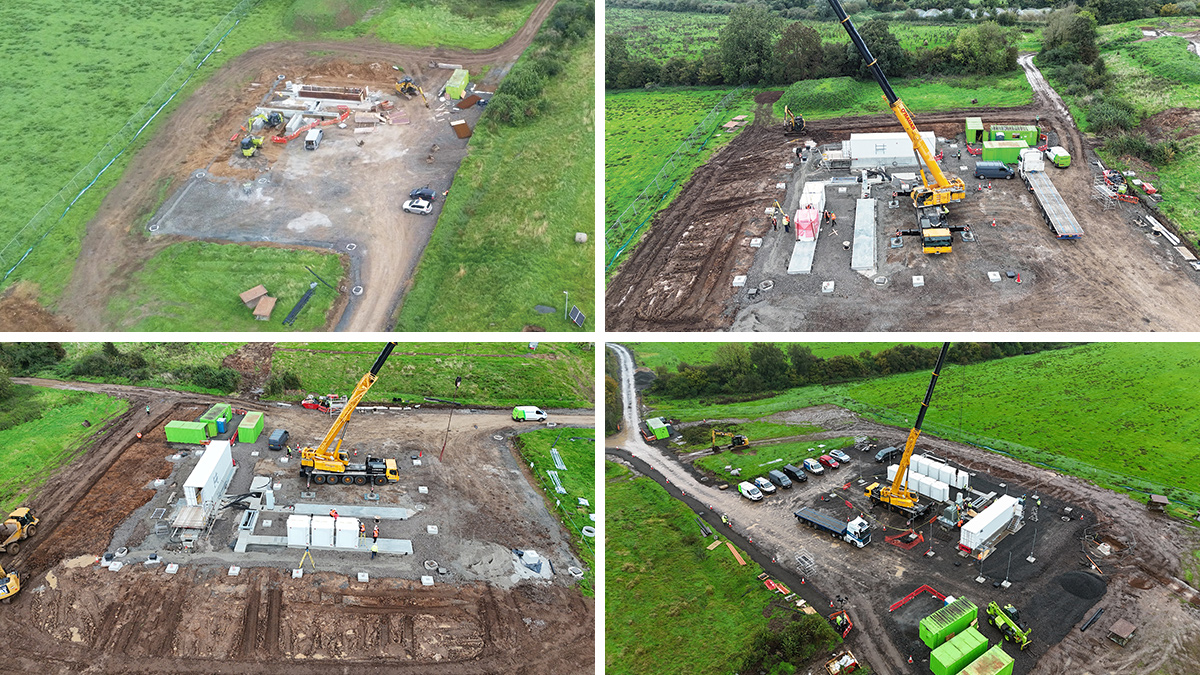
(top left) Installation of precast concrete troughs and concrete slabs, (bottom left & top right) installation of BESS cubes, (bottom right) installation of the transformers – Courtesy of GRAHAM Construction
Early Contractor Involvement (ECI)
Arup was appointed as Project Manager and technical advisor.
Contractor GRAHAM was appointed by NI Water to complete an Early Contractor Involvement (ECI) stage. GRAHAM provided multi-disciplinary detailed design, project and supply chain management and all civil engineering and MEICA works for the contract from start to completion. The ECI phase allowed GRAHAM to consider supply chain partners, complete site surveys, accurate scheme costing and detailed design to meet project objectives which enabled an earliest programme completion date to meet DS3 Service Delivery deadline of April 2024.
Arup provided techno-economic modelling to support business case development and viability of the project. Collaborative working between the project partners via ECI enabled a smooth transition into the construction stage where Arup was NEC Project Manager and Supervisor for the works. The proactive approach from the project team led to enhanced collaboration, innovation, value, efficiency and reduced whole life costs for the project.
Key risks
Numerous strategic risks associated with the delivery of the energy transition were identified, along with project-specific risks such as battery procurement and delivery, as well as site-specific risk. These included interface with stakeholders including NIW Alpha that operates the vital Water Treatment Works. The impacts of these risks through stakeholder engagement and early design development and devised appropriate mitigation measures (e.g. temporary and permanent security arrangements, early engagement with Northern Ireland Electricity (NIE) Networks, HV electrical works design etc). During ECI stage a detailed costed risk register was prepared and completed by the project team. This approach ensured cost certainty and accurate budgeting.
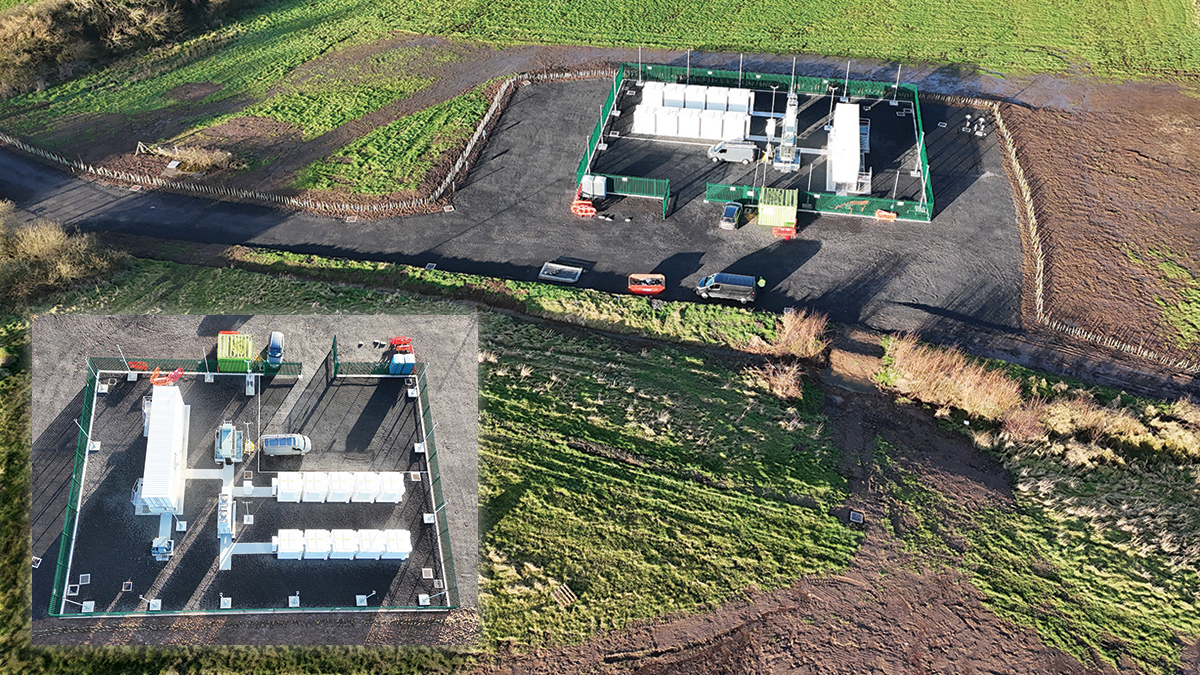
(main image) Site overview and (inset) site layout – Courtesy of NI Water and GRAHAM Construction
Some of the key risks associated with the project are listed below:
Grid code compliance: This was the first large scale battery connected at 33kV in Northern Ireland which presented a complex set of challenges. Ensuring grid compatibility and integration with existing infrastructure was critical, and this involved coordination with protection and control systems to maintain stability and safety.
The design phase required careful site selection and the development of a robust integration plan with current grid components. Regulatory hurdles included ensuring compliance with stringent safety and environmental standards.
Operationally, maintaining long-term reliability and establishing effective monitoring systems was essential. Additionally, integrating with renewable energy sources required managing intermittency and balancing real-time supply and demand.
Finally, community and stakeholder engagement with parties such as Northern Ireland Electricity, SONI and Grid Beyond was crucial for addressing public concerns and aligning interests across utilities, regulators, and local authorities. Each of these factors demanded a coordinated, multidisciplinary approach to ensure successful implementation.
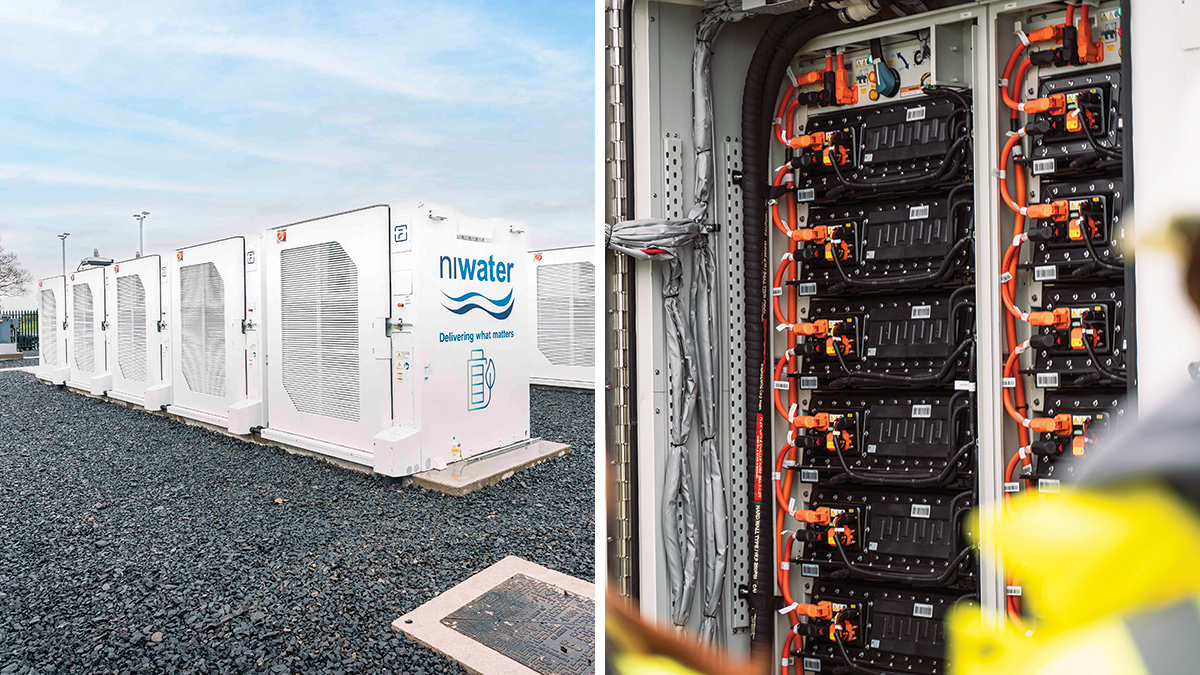
(left) BESS cubes and (right) inside of BESS cubes and gridstack layout – Courtesy of NI Water and GRAHAM Construction
Security & NI Water Alpha requirements: The WTW is critical to NI’s water supply, and it was essential that the new installation integrated fully with the existing installation. As a section of this site was to be re-purposed for the construction of the access road it was crucial to involve NIW Alpha from the outset to ensure that they were aware of the works and how to ensure the site security and operation were unaffected during construction. Key tasks, such as installing new security fencing, implementing CCTV, and working near critical assets, were coordinated with NIW Alpha to prevent any disruption or delay.
Fire mitigation: This BESS was the first installation for this council area. It was critical that the BESS met all legislation and mitigation measures to meet the requirements noted below:
- Identify the fire hazards and risks associated with the premises, materials, processes and materials.
- Identify the people at risk including those who may be especially at risk.
- Demonstrate that the risks will be removed and reduced as far as reasonably practicable.
- Put in place general fire precautions to deal with any remaining risks.
- Set out appropriate emergency procedures in the event of fire.
- Set out additional preventative and protective measures if flammable or explosive substances are to be used or stored on the premises.
- Make provision for fire safety training for staff.
- Set out arrangements for logging significant actions and incidents.
- Set out proposals for reviewing the risk assessment periodically or after significant changes in the workforce.
To align with the information above a Fire Risk and Mitigation Strategy was developed alongside Fluence (the BESS provider) to highlight how this would be managed. A copy of this was provided to Northern Ireland Fire and Rescue Service to ensure they are aware of the requirements if an event was to ever occur.
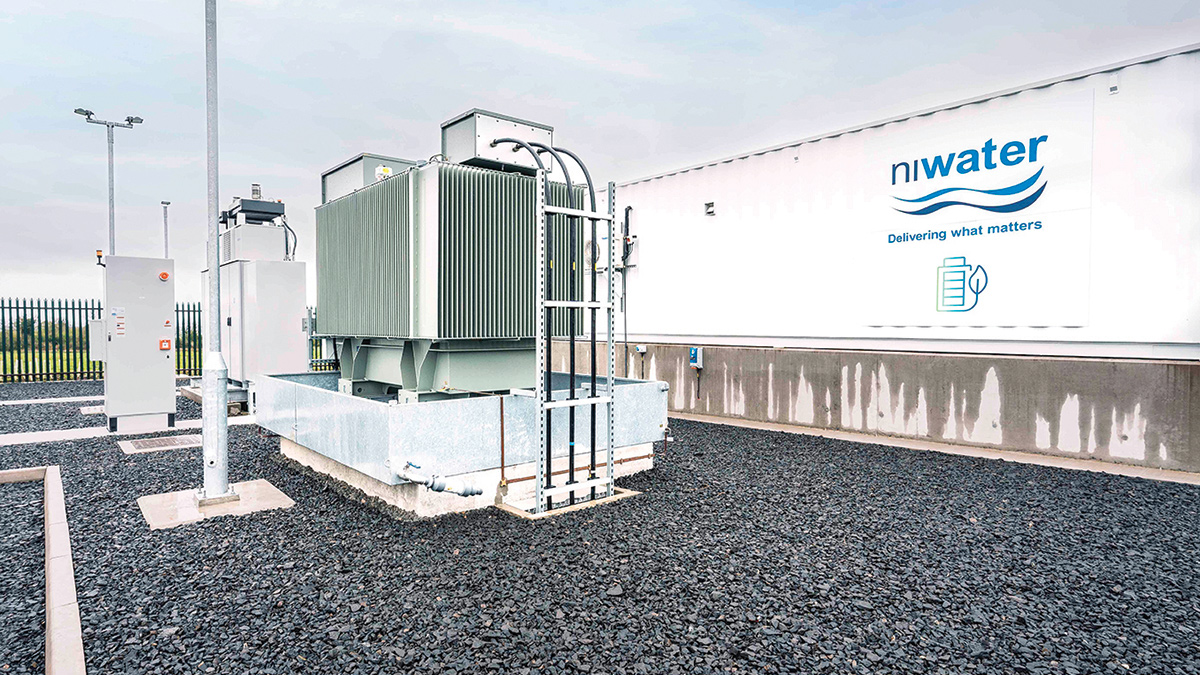
Dunore Point BESS completion – Courtesy of NI Water and GRAHAM Construction
BESS Costs: During the early stages of the project there were unforeseen pressures across the globe on the price and availability of batteries and commodities. This was driven by shortages in battery supply vs demand, fast rising inflation, rising energy costs, and lithium carbonate, electrolyte, copper, steel, and other energy storage materials being in a volatile state which drove shorter offer validity periods and price fluctuation.
On review of the battery market conditions over the 2021, LFP cathode prices rose around 150% and between June and October 2022, these prices rose around 10%. Therefore, given the external market conditions appropriate measures had to be taken to ensure that the project was viable which included monitoring exchange rates, monitoring price of materials etc. An NEC4 ECC Option E contract was selected, which allowed the supply chain to progress rapidly and not price high levels of risk. These risks were managed well, and in turn the battery was made operational on time to meet DS3 Service Delivery and within budget.
Future-proofing: It was necessary to include consideration in business case coordination with a future solar farm in adjacent land. Therefore, as mitigation techno-economic modelling of this longer-term scenario was undertaken to ensure its feasibility and to future-proof NIW’s wider site plan, ensuring the site is capable for the addition of future solar.
BESS revenue
The BESS will provide revenue and cost savings through a diverse ‘revenue stack’:
| DS3 Services |
|
| Energy Arbitrage |
|
| Capacity Market |
|
The operation of the BESS is optimised to maximise revenue and site cost savings.
|
 |
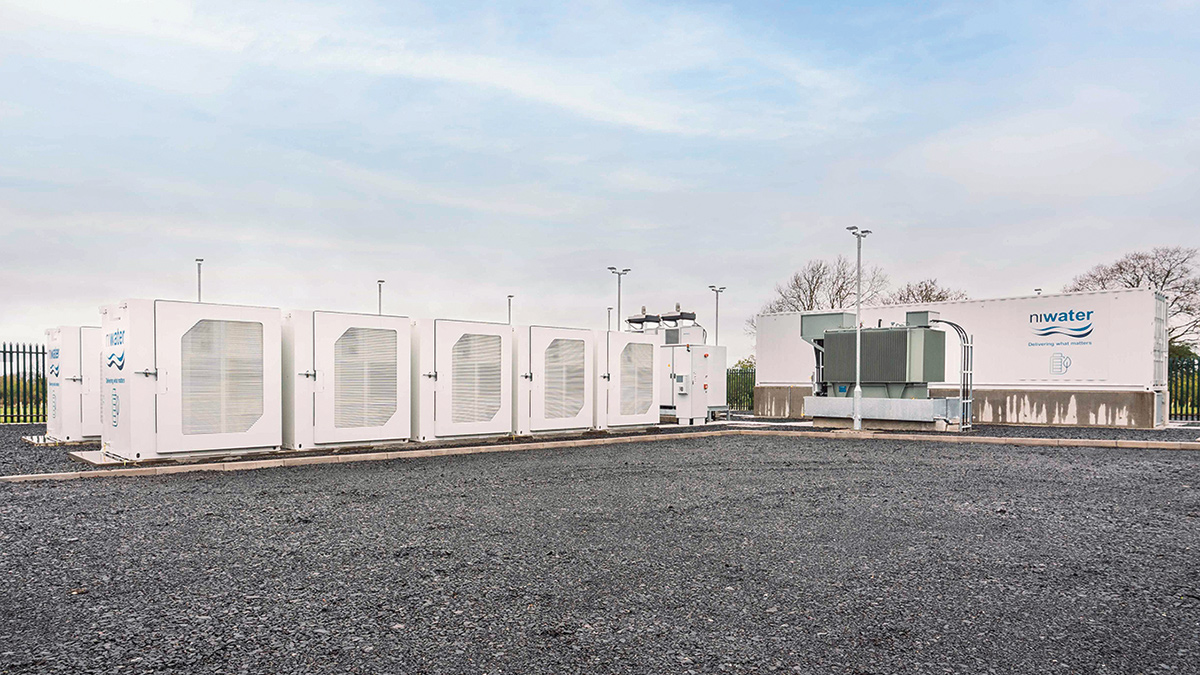
Dunore Point BESS completion – Courtesy of NI Water and GRAHAM Construction
Dunore Point BESS Project: Supply chain – key participants
As principal contractor, GRAHAM had overall responsibility to deliver the project on time and within budget, which they succeeded in doing by working collaboratively with NI Water, Project Manager Arup, suppliers and subcontractors to identify and plan for key project milestones.
Doran Consulting provided civil, structural and geotechnical design services, including the initial enabling and investigatory works carried out at the Early Contractor Involvement (ECI) stage, as well as the detailed design for construction. Scotts Electrical Services were responsible for designing and delivering the HV electrical works alongside Fluence who were responsible for designing and delivering the BESS.
- Project management: Arup
- Principal designer/contractor: Graham Construction
- Civil design: Doran Consulting
- HV designer & HV/LV contractor: Scotts Electrical Services
- BESS supplier & designer: Fluence
- Transformers: GBE Power
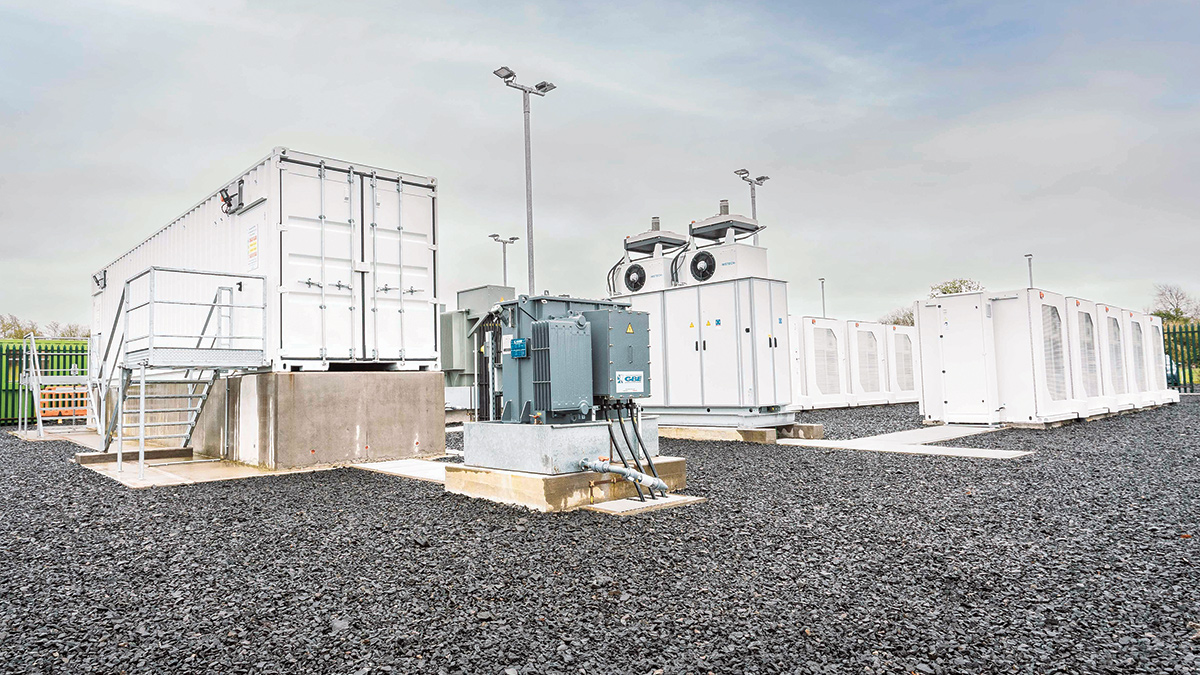
Dunore Point BESS Completion – Courtesy of NI Water and GRAHAMs Construction
Collaboration
The success of this project was largely attributed to the outstanding collaboration among all the project team. From the beginning, everyone was dedicated to maintaining clear and open lines of communication. Regular check-ins and collaborative tools kept everyone on the same page, enabling us to address issues promptly and adapt to changes when required. This included not only the project team but external parties also including SONI and Northern Ireland Electricity. As a result, the project was completed on time, within budget, and to a high standard of quality, demonstrating the power of effective teamwork.
Outcome
Through collaboration with key stakeholders, including NIE and SONI, NI Water, Arup, GRAHAM, and the broader supply chain successfully tackled challenging obstacles. Efforts by all resulted in the delivery of a sustainable, cutting-edge battery system that meets stringent requirements. This achievement helps to position NI Water to play a crucial role in advancing the green economy and ensuring climate resilience for their customers.
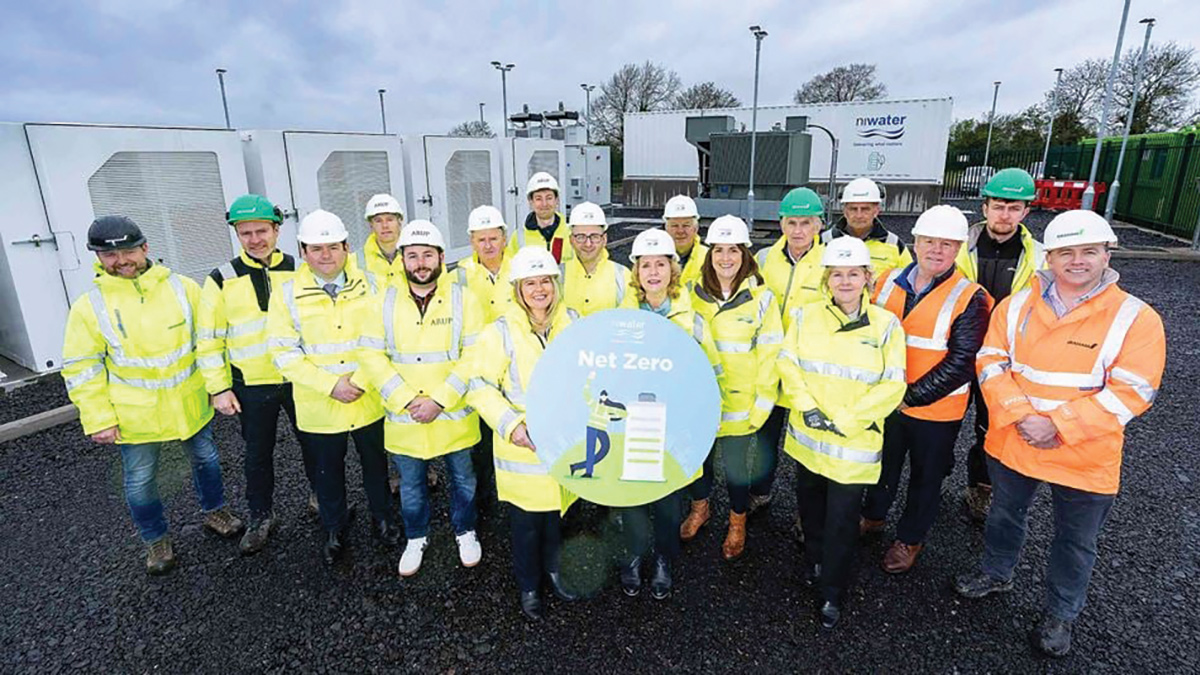
Dunore Point BESS project team – Courtesy of NI Water


